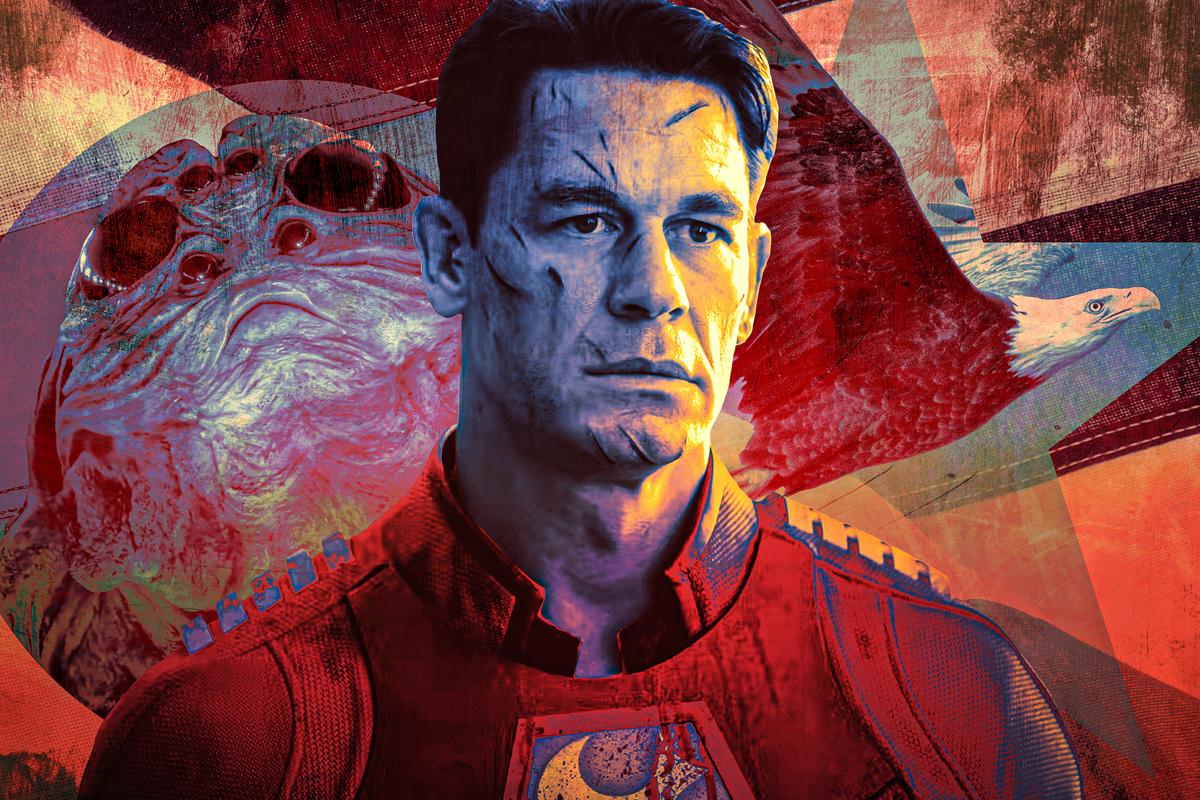

When James Gunn made the switch from the Marvel Cinematic Universe to the DC Extended Universe, he brought one of the MCU’s calling cards with him: shitty dads. In terms of sheer scale, nothing can quite compare to the revelation in Guardians of the Galaxy Vol. 2 that Star-Lord’s father had a planet-sized ego—or that he was a literal planet impregnating beings on other planets—but in light of what we’ve learned about Peacemaker’s upbringing in the first season of his eponymous HBO Max series, it’s a minor miracle that the character (played by John Cena) has some redeeming qualities. In a deviation from the original comics—one that Gunn admitted HBO Max had some concerns with—Peacemaker’s father is Auggie Smith (Robert Patrick), a white supremacist who moonlights as the villainous White Dragon. But as the first season came to a close on Thursday, Peacemaker hadn’t just stopped an alien invasion before four members of the Justice League (Aquaman, the Flash, Wonder Woman, and Superman) could intervene—he’d also repudiated his father’s odious beliefs. For Peacemaker, the latter was the bigger hurdle to clear, and the first big step toward becoming the hero he wants to be.
At first, Auggie’s inclusion in Peacemaker seemed like an easy cop-out for some of its title character’s most abhorrent moments in Gunn’s sequel-cum-reboot The Suicide Squad. (Peacemaker might be a jingoistic killer, but hey, it could be worse: at least he’s not an avowed white supremacist.) But beneath all the juvenile humor intrinsic to Peacemaker’s edgelord DNA, the first season has explored how toxic ideologies are passed down to younger generations who simply want to do the right thing, and the flawed notions of peace that come with trying to be a better person. Outside of Peacemaker’s daddy issues, the show also revealed that Leota Adebayo (Danielle Brooks), the newest member of a ragtag team tasked with stopping a secret, Invasion of the Body Snatchers–style alien invasion, is Amanda Waller’s daughter. Coerced into the family business by Waller after losing her job, Adebayo and Peacemaker formed a genuine bond that’s influenced in part by the compromises they’ve made in the hopes of winning their parents’ approval. And in a season finale that featured a gnarly shootout, a gooey alien blob the size of a skyscraper, and a cameo from Jason Momoa’s Aquaman who’s annoyed about persistent rumors that he fucks fish (yes, really), Peacemaker hinged on the idea of embracing a found family—even if that found family is a collection of damaged weirdos.
Peacemaker marked Gunn’s first time as a showrunner—he wrote the entire season and directed five of its eight episodes, including the finale, and is responsible for creating one of the best opening credit sequences of all time. With that extra runway, the show hasn’t just expanded on a tragic backstory—including how Peacemaker accidentally killed his brother and was blamed for it by his father—but has also added layers to its villains, and thus, its centerpiece character study.
Known as Butterflies, these aliens have to inhabit a human host to survive, effectively killing them while retaining their memories—and over the course of time, they’ve taken over the bodies of people in various positions of power. But as Peacemaker discovers in the finale, “It’s Cow or Never,” their mission is one born out of self-preservation—but not just their own. As the Butterfly leader Goff explains, they left their home planet because it became uninhabitable, and they’re witnessing a similar path of self-destruction on Earth. “The people of Earth were on the exact same trajectory as our people had been: ignoring science in favor of populist leaders who tell you that the floods and the fires and the disease are unrelated to your own actions, valuing profit over survival, treating minor inconveniences as assaults on your freedom,” Goff tells Peacemaker.
Believing that humans are incapable of making better decisions for themselves, the Butterflies chose to intervene. Goff sees something of a kindred spirit in Peacemaker, an antihero who infamously shared his philosophy in The Suicide Squad without a hint of irony: “I cherish peace with all my heart, I don’t care how many men, women, and children I need to kill to get it.” But rather than agree to help the Butterflies, Peacemaker kills their food source—the aforementioned giant alien blob—for the simple reason that the aliens would’ve had to eliminate his friends to keep the ruse going. In essence, Peacemaker chooses his new family over the prospect of peace—an invasive and morally dubious form of peace, but peace nevertheless.
Peacemaker’s decision to doom the Butterflies marks a fascinating parallel to his fateful moment in The Suicide Squad, when he kills Rick Flag because he chose to follow Waller’s ruthless orders to a tee. (“Peacemaker … what a joke,” Flag says before dying, a statement that has haunted the character ever since.) But while it’s clear that Peacemaker is a different (and better) person at the end of Season 1, it doesn’t necessarily mean that he did the right thing. The world is still a fucked-up place where profits take precedence over human lives, and while the Justice League cameos were hilarious, the fact that they showed up late to the party underlined how they can’t always be counted on to save the day.
In spite of the character’s growth over the course of the season and the bonds he forms with his teammates, Peacemaker still has personal demons to contend with. He might have killed his evil father in the penultimate episode of the season to break the cycle of abuse, but Auggie appears twice in the finale to torment his son; he is a devil on the shoulder who will be hard to shake, no matter how much good Peacemaker tries to do. With the series officially renewed on Wednesday, the antihero’s surprisingly profound and unsurprisingly profane journey of introspection has more twists in store. Peacemaker may no longer feel the need to kill as many men, women, and children as necessary in the bloody pursuit of peace, but inner peace remains out of reach—like an eagle soaring through the sky.

